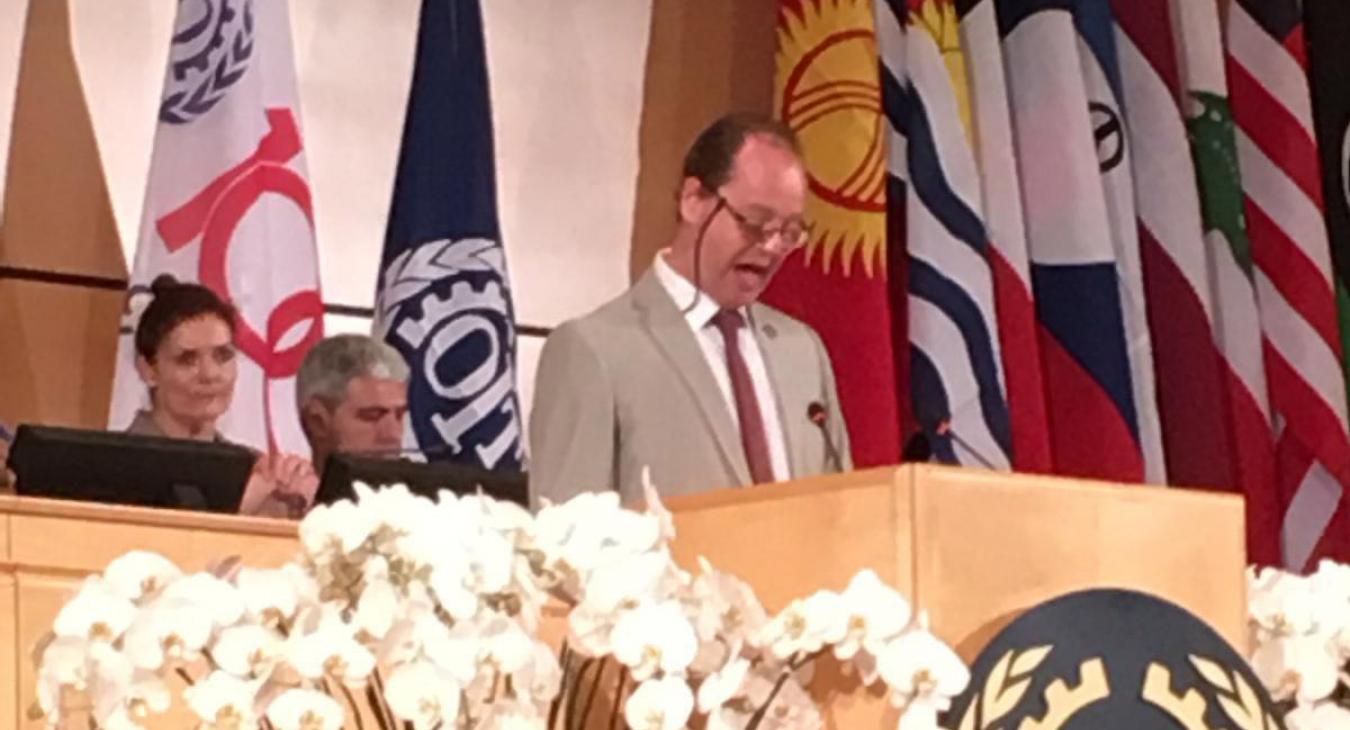
David Joyce outlines the key issues that Congress will be raising at the forthcoming 107th Session of the International Labour Organisation (ILO). David will represent Congress at the ILO's annual gathering
Some reflections from the 107th International Labour Conference (ILC) (added 12 June)
It was indeed a privilege to represent Congress at the recent ILC in Geneva. It was a hectic 2 weeks of mainly intensive committee meetings negotiating with the world's governments and employers on the development of a new international standard on violence and harassment in the world of work. The discussions were the first year of two and proved to be very difficult indeed. Importantly, the workers group won the room in terms of the need for a Convention (legally binding international treaties that may be ratified by member states) supplemented by a Recommendation (which serve as non-binding guidelines). Employers favoured only the latter. Committee members worked hard to develop a draft convention that Governments can ratify and that was a balance between the aspirational and practical. The definition and scope was broadly agreed and we had successes in terms of gaining a broad consensus that violence and harassment are unaccepatable and that such an instrument would help to provide a route to protection for all workers. We succeeded in ensuring that gender based violence was recognised as a particular form of violence requiring distinct solutions. We succeded in ensuring recognition of vulnerable groups - (although specific mention of some groups proved challenging top groups of governments and this is something we will return to next year.) Crucially we succeeded in ensuring that workplaces recognise that domestic violence is linked to the world of work and that workplaces can play an imnportant role in prevention and support. Our spokesperson, Marie Clarke Walker from Canada, played a blinder and encouraged everyone to return in 2019 with a view to finishing our work and in agreeing an important global standard in the centenary year of the ILO. You can follow the work of the Committee here.
Other highlights this year included a mention of our case on collective bargaining rights in the Committee on the Application of standards - IBEC expressing concern about the Competition Amendment Act.
My own speech to the plenary is here.
General Secretary, Patricia King participated in the World of Work Summit on 7th June.
I also met with General Secretary of the Palestine General Federation of Trade Unions, Shaer Saaed. He was very interested in Frances Black's Occupied Territories Bill in the Oireachtas and expressed support for our work in seeking its passing. I passed on our solidarity to Palestine Workers.
And of course the highlight for Ireland was the very well received address to the conference plenary by President Michael D Higgins. In a wide ranging address he outlined why the ILO and Tripartism was so important in today's fractured world. One of my Swedish colleagues suggested that it was the best speech at the ILO since Olaf Palme in the 1980s.
Some pics from the week are available here.
ILO roundup of events here.
Original blog:
Congress will bring the Decent Work agenda to the next meeting of the International Labour Conference (ILC) starting on May 28, voicing our concerns on the failure of successive Irish governments to uphold and vindicate essential rights for workers, such as the Right to Collective Bargaining.
The ILO is the United Nations agency set up specifically to deal with the world of work, labour standards and social protection. The agency brings together delegates from 187 countries worldwide on a tripartite basis, comprising representatives of trade unions, employers and governments.
In fact, the ILO effectively sets the overall standards that govern workplaces globally, as set out in its Eight Fundamental Conventions that establish key principles and rights at work, specifically in areas such as freedom or association, bargaining rights, forced labour and equality.
The annual gathering of this unique international forum therefore offers a significant opportunity to measure and compare Ireland's progress on a global scale, with respect to labour rights, social protection and wider equality.
The 107th Session of the ILO holds some significance for this country, as the Irish government is currently on the governing body of the organisation and President Higgins is scheduled to address a special World of Work conference there, on June 7, which Congress General Secretary Patricia King will also attend.
For our part, Congress will be raising a number of issues at the ILO, including:
- The absence of full collective bargaining rights for workers in Ireland;
- The rise of precarious work and urgent need for legislation to deliver protection for a whole swathe of vulnerable and exploited workers for whom insecurity is becoming the new norm;
- Ireland's low pay problem, which sees some 70% of earners at or below the average industrial wage;
- The lack of workplace pension coverage for two thirds of private sector workers who will have only the state pension for support in retirement;
- The failure to move forward on a Just Transition to a carbon free future, even though unions have signalled a willingness to engage on this issue.
These are core issues in terms of delivering on the Decent Work agenda for workers in Ireland, but Congress will also be highlighting the housing and homeless crisis, given the serious impact it has on working people across all sectors of the economy.
Having abandoned housing provision to the market and private profit, we now find that the market is utterly incapable of delivering, or only capable of doing so at prices that are well beyond the incomes of the majority of workers. That is why Congress developed the Charter for Housing Rights and has engaged in a major national lobby of TDs across the country, seeking their support for the principles outlined in the Charter.
On a brighter note, I will be happy to report to delegates from across the world that we have made progress in our dialogue with employers on how we might address the Gender Pay Gap and hope to see the Gender Pay Gap Bill enacted soon.
On the international front, the news is less positive and recent events in Palestine – including the deaths of over 60 innocent civilian protestors in Gaza, in May – led Congress to call for the expulsion of Israeli diplomats from Ireland, including the Israeli ambassador.
In that context, I will inform ILO delegates that Congress is fully backing new legislation from Senator Frances Black that would ensure the effective boycott of goods from the illegal Israeli settlements and we will be demanding that our government does the same.

